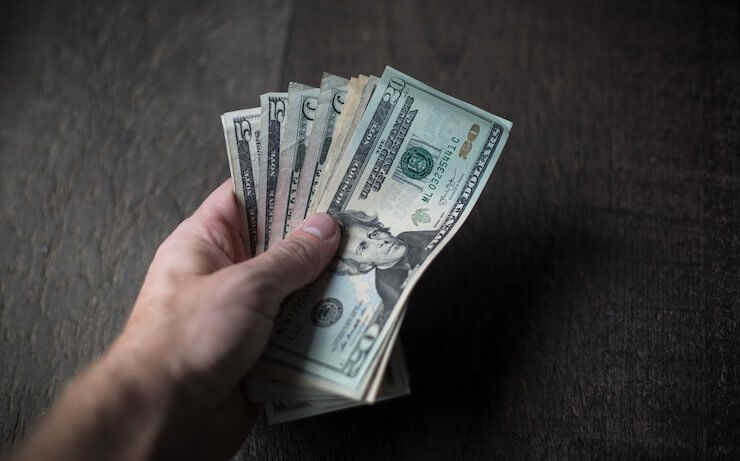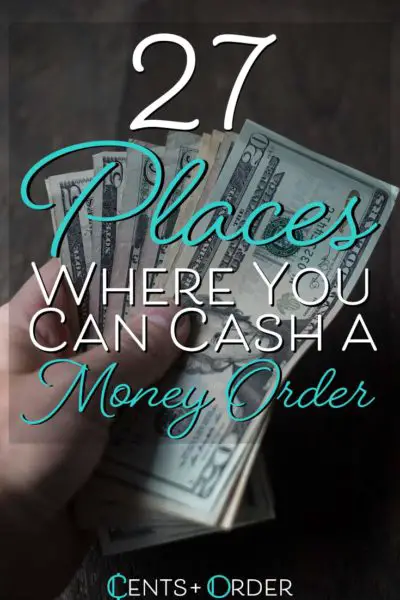If you’re reading this article, then odds are someone has given you a money order and you’re wondering how to turn it into cash. Perhaps you’ve been paid for a job with a money order or maybe you’ve been given one as a gift.
When my wife and I were married, I can remember finding a $100 money order tucked inside one of our wedding cards. It was the first time I had ever across one and I distinctly remember thinking to myself, “What is this thing and what am I supposed to do with it?”
You may have similar questions. If so, the following section briefly explains what money orders are and how they work.
Table of Contents
How Money Orders Work
Most money orders are issued by one of two companies, Western Union or Moneygram, who, in turn, partner with scores of third party sellers across the United States. The USPS also issues money orders which can be purchased at local post offices but are not sold at third party retailers.
In practice, money orders are very similar to checks, with the key difference being that buyers of money orders are required to fully fund them at the time of purchase.
That’s good news for you if you’ve just received a money order, because as long as the money order is legitimate, it’s about as close as you can come to actually receiving cash.
For those of us who have dealt with the hassle and frustration of being given a check that later bounced, the guaranteed nature of money orders is an attractive perk.
While there are countless banks and stores that sell money orders, finding places that will cash them can be a bit more difficult. Those that do often charge a fee, and these fees can vary widely from 50 cents to several dollars.
Let’s take a look at the different types of places that will cash money orders, from least to most expensive.
Banks and Credit Unions
Nearly all banks and credit unions will cash money orders for FREE as long as you are one of their customers. You can also simply choose to deposit the money into your checking account if you don’t need immediate access to the funds.
If for some reason you should want to cash your money order at a bank or credit union that you are NOT a customer of, you can usually do so, but expect to be charged a fee.
On our list, we have shown these fees, but please remember that they only apply to non-customers.
Retailers
Several grocery stores and big box stores will cash money orders for a fee.
Many of these retailers will only cash either Western Union or MoneyGram money orders, depending on who they have partnerships with.
Some are even more restrictive by only cashing money orders if they were purchased in one of their stores.
Check Cashing Stores
No matter where you are right now as you read this article, you are probably no more than a few miles away from one of these stores.
While their prevalence makes them convenient, these are usually the most expensive places to cash a money order.
Their fees also tend to vary by location. To find out how much a check cashing store near you charges to cash money orders, your best bet is to just give them a call.
27 Places Where You Can Cash a Money Order Near You
Now that you understand the basics of money orders, let’s take a look at the list of 27 places near you that could turn that money order you’re holding into cash!
1. ACE Cash Express
- Type of Business: Check cashing store
- Fees: Vary by location.
- Find location: https://www.acecashexpress.com/locations
2. Amscot: The Money Superstore
- Type of Business: Check cashing store
- Limit: No limit
- Fee: 9.9%
- Find location: https://www.amscot.com/locations.aspx
3. Bank of America
- Type of Business: Bank
- Limit: Up to $500
- Fee: $6 per money order
- Find location: https://locators.bankofamerica.com/search
4. BB&T
- Type of Business: Bank
- Limit: None specified
- Fee: Free under $50; $8 for money orders over $50
- Find location: https://www.bbt.com/locator/search.page
5. Capital One
- Type of Business: Bank
- Limit: None specified
- Fee: None for money orders under $100; $7 for money orders over $100
- Find location: http://maps.capitalone.com/locator/
6. Chase Bank
- Type of Business: Bank
- Limit: None specified
- Fee: $8
- Find location: https://locator.chase.com/
7. Check Into Cash
- Type of Business: Check cashing store
- Fees: Vary by location
- Find location: http://local.checkintocash.com/
8. Citibank
- Type of Business: Bank
- Limit: $5,000
- Fee: Free for Citibank-issued money orders
- Find location: https://online.citi.com/US/GCL/citilocator/flow.action
9. Cliff’s Check Cashing
- Type of Business: Check cashing store
- Fees and limits: Vary by location
- Find location: http://cliffscheckcashing.com/all_stores.php
10. Family Fare
- Type of Business: Grocery store
- Limit: $500
- Fee: Varies by location
- Find location: https://www.shopfamilyfare.com/store-locator
11. Friendly Check
- Type of Business: Check cashing store
- Fees and limits: Vary by location
- Find location: http://friendlycheck.com/store-locator/
12. Fifth Third Bank
- Type of Business: Bank
- Limit: None specified
- Fee: 4% of face value with a minimum of $5
- Find location: https://locations.53.com/search.html
13. Giant Eagle
- Type of Business: Grocery store
- Limit: Typically $500 (will only cash money orders issued by Giant Eagle)
- Fee: None
- Find location: https://www.gianteagle.com/store-locator
14. H-E-B
- Type of Business: Grocery store
- Limit: $1,000
- Fee: 69 cents
- Find location: https://www.heb.com/store-locations
15. HSBC
- Type of Business: Bank
- Fees and limits: Vary by location.
- Find location: https://www.us.hsbc.com/1/2/home/customer-service/hsbc-locations/branch
16. KeyBank
- Type of Business: Bank
- Limit: None specified
- Fee: $5-$10
- Find location: https://locations.key.com/search.html
17. Kroger
- Type of Business: Grocery store
- Limit: $2,000
- Fee: $3
- Find location: https://www.moneyservices.com/find-store/
18. Money Mart
- Type of Business: Check cashing store
- Fees and limits vary by location
- Find location: https://www.moneymart.com/StoreDetails/FindaStore
19. Old Second Bank
- Type of Business: Bank
- Limit: $1,500
- Fee: $5 for money orders less than $500; 1% of face value for over $500.
- Find location: http://www.oldsecond.com/resources-services/locations/
20. Regions Bank
- Type of Business: Bank
- Limit: None specified
- Fee: 5% of the money order amount with a $5 minimum fee
- Find location: https://www.regions.com/Locator
21. Safeway
- Type of Business: Grocery store
- Fees and limits vary by locations (some will only cash money orders that have been issued within the last 7 days)
- Find location: http://www.safeway.com/ShopStores/tools/store-locator.page
22. SunTrust
- Type of Business: Bank
- Limit: None specified
- Fee: 1 – 3% of the money order’s value + $7 fee
- Find location: https://www.suntrust.com/findus
23. TD Bank
- Type of Business: Bank
- Limit: Varies by location (will only cash money orders issued by TD Bank)
- Fee: $7
- Find location: https://www.tdbank.com/net/absearch/
24. US Bank
- Type of Business: Bank
- Limit: None specified
- Fee: $7
- Find location: https://www.usbank.com/locations/
25. Speedy Cash
- Type of Business: Check cashing store
- Fees and limits: Vary by location
- Find location: https://www.speedycash.com/find-a-store/search
26. Walmart
- Type of Business: Retailer
- Limit: $5,000 (will only cash money orders issued by Walmart)
- Cost to Cash:
- Maximum fee of $3 for money orders up to $1,000
- $6 for money orders greater than $1,000.
- Find location: https://www.walmart.com/store/finder
27. WinCo
- Type of Business: Grocery store
- Fees and Limits: Vary by location (will only cash money orders issued by WinCo)
- Find location: https://www.wincofoods.com/stores
What You Will Need to Do
There’s two things that you’ll need to do before you can convert your money order into cash: endorse the money order and validate your identity.
1. Endorse the Money Order.
You do this by simply signing your name on the back. Don’t sign the money order until you are ready to hand it over to the employee at the store or bank.
2. Validate Your Identity.
Most businesses will require that you provide some proof of your identity. Expect that only government-issued forms of identification will be accepted. These include: driver’s licenses, passports, state IDs, or military IDs.
If you don’t have an ID, some banks will allow you to provide two forms of secondary ID. Common secondary forms of ID include:
- High school photo ID
- College photo ID
- Employment photo ID
- Firearms permit photo ID
- Foreign driver’s license photo ID
- Permanent resident photo card
- U.S. birth certificate
- U.S. employment authorization photo ID
- Welfare photo ID
Once you’ve endorsed your money order and validated your identity, you will be given your cash, minus any transaction fees. Be sure get your cash to a safe and secure place as quickly as possible!
25 Places That Don’t Cash Money Orders
To save you time and hassle, we’ve compiled a list of 25 popular stores that many expect to be able to cash money orders, but unfortunately, do not.
Note: Most of these businesses do sell money orders, but will not cash them. And once again, the banks on this list only refuse to cash money orders to non-customers.
- 7-Eleven
- Albertsons
- Aldi
- BJ’s Wholesale
- Costco
- CVS
- Dollar General
- Dollar Tree
- Duane Reade
- Food Lion
- Hy-Vee
- Mariano’s
- Pick ‘n Save
- Publix
- PNC Bank
- Rite Aid
- Target
- Trader Joe’s
- True Value
- Sam’s Club
- Whole Foods
- Walgreens
- Wells Fargo
- Whole Foods
- Winn Dixie



